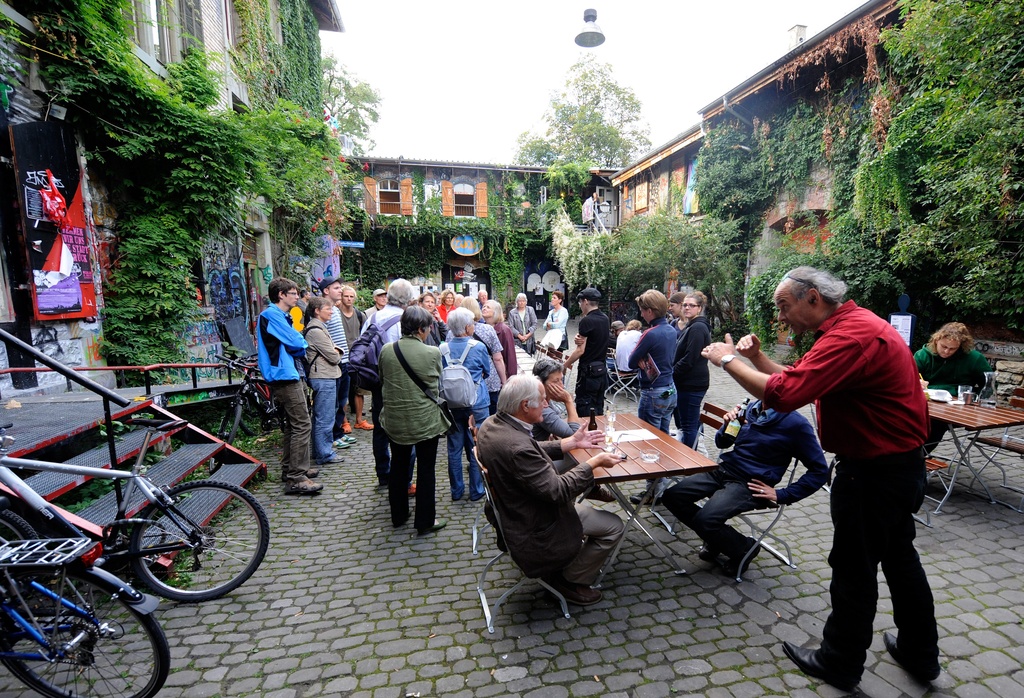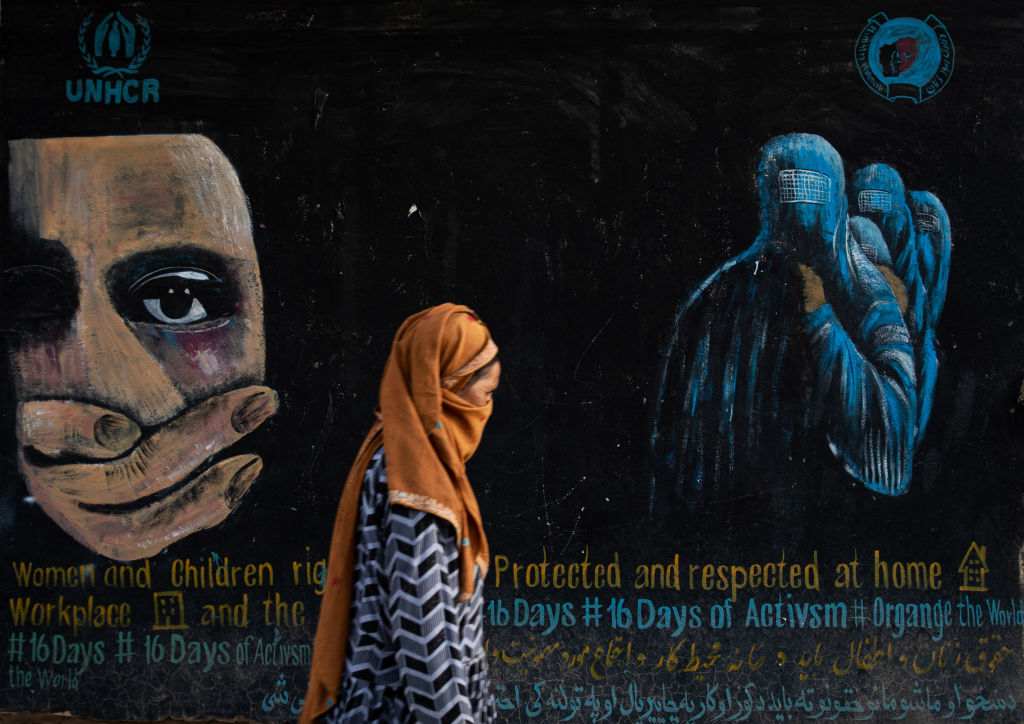
Voters to decide on Bern culture centre

Considered an illegal mess by its critics, a jewel of alternative culture by its supporters, Bern’s Reitschule has polarised political debate for more than 20 years.
On September 26, voters in the Swiss capital will vote on the future of the city-owned autonomous youth centre for the fifth time in 23 years.
As trains pull into Bern station, passengers can’t miss the Reitschule – more commonly known as the Reithalle – just a few metres across the road.
Covered in graffiti, the imposing building, with its half timbering and small towers, sticks out like a sore thumb. Critics say visitors must wonder where on earth they’ve come to.
If the bear on the façade could talk, it would have many stories to tell about the venerable building’s history, which dates back to 1897.
Gradually abandoned by its original inhabitants, it was occupied for the first time at the beginning of the 1980s, in the wake of violent social unrest among radical leftists in Zurich, by young people who wanted somewhere where they could run their own entertainment free from mainstream commercial and social pressures.
The Reitschule was cleared out by the police in 1982 and the situation simmered until late 1987. Then, following the eviction of a riverside counterculture community, thousands demonstrated in the city centre, a large group re-squatted the Reitschule and, perhaps most significantly, retailers reported a ten per cent loss in profits over the Christmas shopping season.
In the face of such a groundswell of discontent, the police and city council adopted a damage-limitation policy and left the Reitschule squatters to their own devices. The building became one of the most important autonomous youth centres in the country.
Since then, the Reitschule has continued to split opinion in Bern. In 23 years voters have given it the thumbs up four times.
Its critics see it as a hotbed of leftwing extremism and a honey pot for drug dealers and hope the fifth vote will go their way. The motion to close the centre has been put forward by the local section of the rightwing Swiss People’s Party.
Better dialogue
The battle against the Reitschule is embodied by Erich Hess, the 29-year-old head of the People’s Party’s youth wing. Born in the Emmental countryside, Hess says his idea of culture is playing the accordion up in the Alps and tossing the Swiss flag, a traditional sport.
In his view, the Reitschule should be sold to the highest bidder, without any mention of what will become of it – a swimming pool, shopping centre or offices.
The People’s Party is supported by the local section of the centre-right Radical Party, one of whose members, Kurt Wasserfallen, was the former head of police and was known as “Mr Zero Tolerance”.
Wasserfallen, who died in 2006, was the sworn enemy of the so-called antifascists whom he accused of using the Reitschule as a base for planning, in his view, violent acts.
But Reto Nause, head of security in Bern and a member of the centre-right Christian Democratic Party, thinks there is no longer cause for alarm.
“The days when violent demonstrators used the Reitschule as a base camp ended two years ago,” he said.
Tom Locher, a spokesman for the Reitschule, added that dialogue between the cantonal police and the Reitschule dwellers, who continue to denounce “police provocation”, had improved in recent years.
Less political
Marco Giugni, a political scientist at Geneva University, says tensions surrounding autonomous youth centres are often connected to the economy and local politics.
“In Geneva for example the clamping down by the authorities resulted in serious tension with the squatters and the alternative scene.”
In general, most autonomous centres have undergone a process of institutionalisation over the past 30 years, he added.
“Their main concerns now are more to do with keeping going than with political mobilisation.”
Locher cites the example of the complex key system now in place, “whereas 20 years ago anyone could come and go as he pleased”.
However, Giugni said a political remobilisation was witnessed following the alter-globalisation movement at the end of the 1990s and that the anti-WEF demonstrations would often end in chaos around the Reithalle in the first five years of the new century.
Drug problem
But if the Reitschule is controversial, it’s not just because of its political activities. The centre is also accused of being a point of reference for drug dealers and users.
The murder of a dealer in front of the Reitschule in August 2008 provoked an outcry in Bern. At the time, dozens of heroin addicts had taken control of the square in front of the building, contributing to the Reitschule’s “disastrous image”, as Locher put it.
“We’ve been victims of municipal decisions that chased the addicts out of the town centre,” he said.
Thanks to constant dialogue with the addicts and the repossession of the public space in front of the Reitschule – notably the opening of a bar and the staging of concerts – the drug phenomenon has largely been curbed, as the authorities themselves admit.
There was much social unrest in Switzerland in 1980, most noticeably among radical leftists.
Zurich’s Autonomous Youth Centre – intended as a police-no-go building where young people could run their own entertainment free from mainstream commercial and social pressures – was violently suppressed, and a similar movement in Bern which took over the Reitschule (an abandoned city-owned former riding school near the train station, also known as the Reithalle) was also evicted by the police.
Despite problems with violent anarchist gangs in the early 1990s, the Reitschule – now an arts centre and activist collective – has come to be highly valued by alternatively minded Bernese, and has even gained a certain official legitimacy while remaining in a curious legal grey area.
Its cinema, for instance, is licensed with the council but the bar next to it is illegal; the concert venue pays its taxes, while the adjacent café is packed with dope-smokers.
Unlike the similar Rote Fabrik movement in Zurich, the Reitschule co-operative has consistently rejected proposals to accept funding from the city council, sticking tight to its counter-cultural principles (“No violence, no sexism, no commercial exploitation”) by raising its own money through ticket sales, bar profits and an extremely popular annual fundraising party.
Through effective word-of-mouth networking, it has been able to stage gigs by British, European and American bands and DJs, raising its profile still further, yet to this day, the police don’t venture into the complex, turning a deliberate blind eye to such a self-contained concentration of – mostly very innocuous – lawbreaking.
It is a run-down, heavily lived-in place and an obvious honeypot for drug dealers (who are barred from entry, but nonetheless gather outside), yet these days is quite safe.
(Translated from French by Thomas Stephens)

In compliance with the JTI standards
More: SWI swissinfo.ch certified by the Journalism Trust Initiative















![The four-metre-long painting "Sonntag der Bergbauern" [Sunday of the Mountain Farmers, 1923-24/26] had to be removed by a crane from the German Chancellery in Berlin for the exhibition in Bern.](https://www.swissinfo.ch/content/wp-content/uploads/sites/13/2025/12/01_Pressebild_KirchnerxKirchner.jpg?ver=a45b19f3)














You can find an overview of ongoing debates with our journalists here . Please join us!
If you want to start a conversation about a topic raised in this article or want to report factual errors, email us at english@swissinfo.ch.